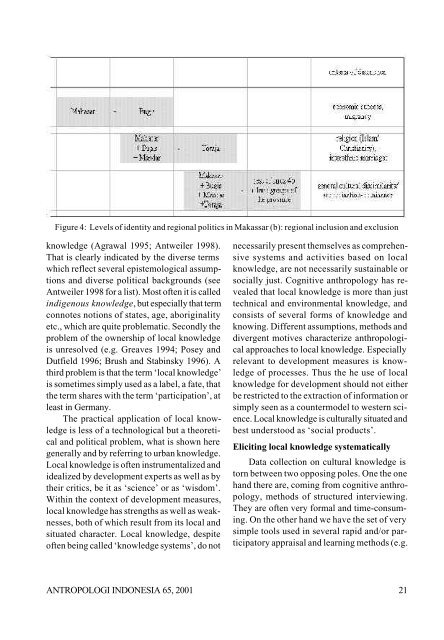Transethnic Identity and Urban Cognition in Makassar: - Antropologi ...
Transethnic Identity and Urban Cognition in Makassar: - Antropologi ...
Transethnic Identity and Urban Cognition in Makassar: - Antropologi ...
You also want an ePaper? Increase the reach of your titles
YUMPU automatically turns print PDFs into web optimized ePapers that Google loves.
Figure 4: Levels of identity <strong>and</strong> regional politics <strong>in</strong> <strong>Makassar</strong> (b): regional <strong>in</strong>clusion <strong>and</strong> exclusion<br />
knowledge (Agrawal 1995; Antweiler 1998).<br />
That is clearly <strong>in</strong>dicated by the diverse terms<br />
which reflect several epistemological assumptions<br />
<strong>and</strong> diverse political backgrounds (see<br />
Antweiler 1998 for a list). Most often it is called<br />
<strong>in</strong>digenous knowledge, but especially that term<br />
connotes notions of states, age, aborig<strong>in</strong>ality<br />
etc., which are quite problematic. Secondly the<br />
problem of the ownership of local knowledge<br />
is unresolved (e.g. Greaves 1994; Posey <strong>and</strong><br />
Dutfield 1996; Brush <strong>and</strong> Stab<strong>in</strong>sky 1996). A<br />
third problem is that the term ‘local knowledge’<br />
is sometimes simply used as a label, a fate, that<br />
the term shares with the term ‘participation’, at<br />
least <strong>in</strong> Germany.<br />
The practical application of local knowledge<br />
is less of a technological but a theoretical<br />
<strong>and</strong> political problem, what is shown here<br />
generally <strong>and</strong> by referr<strong>in</strong>g to urban knowledge.<br />
Local knowledge is often <strong>in</strong>strumentalized <strong>and</strong><br />
idealized by development experts as well as by<br />
their critics, be it as ‘science’ or as ‘wisdom’.<br />
With<strong>in</strong> the context of development measures,<br />
local knowledge has strengths as well as weaknesses,<br />
both of which result from its local <strong>and</strong><br />
situated character. Local knowledge, despite<br />
often be<strong>in</strong>g called ‘knowledge systems’, do not<br />
ANTROPOLOGI INDONESIA 65, 2001<br />
necessarily present themselves as comprehensive<br />
systems <strong>and</strong> activities based on local<br />
knowledge, are not necessarily susta<strong>in</strong>able or<br />
socially just. Cognitive anthropology has revealed<br />
that local knowledge is more than just<br />
technical <strong>and</strong> environmental knowledge, <strong>and</strong><br />
consists of several forms of knowledge <strong>and</strong><br />
know<strong>in</strong>g. Different assumptions, methods <strong>and</strong><br />
divergent motives characterize anthropological<br />
approaches to local knowledge. Especially<br />
relevant to development measures is knowledge<br />
of processes. Thus the he use of local<br />
knowledge for development should not either<br />
be restricted to the extraction of <strong>in</strong>formation or<br />
simply seen as a countermodel to western science.<br />
Local knowledge is culturally situated <strong>and</strong><br />
best understood as ‘social products’.<br />
Elicit<strong>in</strong>g local knowledge systematically<br />
Data collection on cultural knowledge is<br />
torn between two oppos<strong>in</strong>g poles. One the one<br />
h<strong>and</strong> there are, com<strong>in</strong>g from cognitive anthropology,<br />
methods of structured <strong>in</strong>terview<strong>in</strong>g.<br />
They are often very formal <strong>and</strong> time-consum<strong>in</strong>g.<br />
On the other h<strong>and</strong> we have the set of very<br />
simple tools used <strong>in</strong> several rapid <strong>and</strong>/or participatory<br />
appraisal <strong>and</strong> learn<strong>in</strong>g methods (e.g.<br />
21


